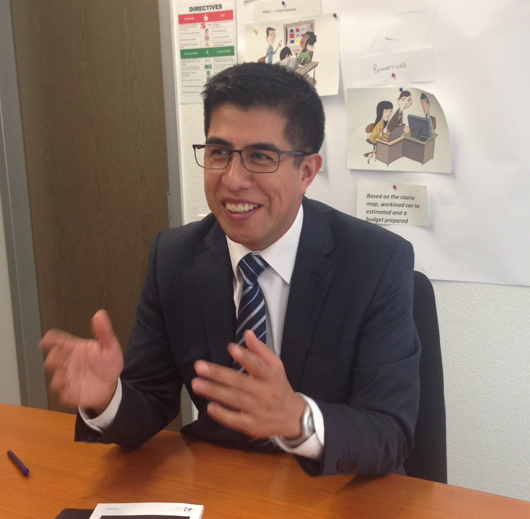 |
About Martin LopezMartin Lopez has over 14 years of professional experience in trade - related technical assistance. Prior to joining ITC in 2010, he worked on designing and providing trade information and market intelligence services for exporters through CeproBol (the Bolivian Export Promotion Agency) of which he later became Executive Director. Martin holds a degree in International Trade Sciences and a post graduate degree in Business Administration. His role at ITC is to coordinate technical interventions and capacity building activities in various countries on behalf of ITC’s Trade Information Services Section |
ITC E-learning recently sat down with Martin and discussed his views on e-learning as employed by the ITC, the challenges faced in course development, and his ideas for the future of e-learning.
|
ITC E-Learning: What do you see as the main advantages of e-learning?
Martin: I see e-learning as an additional channel to interact with our clients and to share ITC’s knowledge. It is a unique way to trigger discussion with people in the field who work hands-on in TRTA, by creating a dialogue and receiving feedback in the discussion forum, which also allows participants to feel accompanied and coached in the courses they take.
ITC E-Learning: What do you think about the idea of peer grading? Do you think it could be useful for the courses?
Martin: Peer grading could be a good way to prompt participants to gain more knowledge on certain topics through checking the work that others have done, but at the same time, some answers can be quite subjective sometimes, “neither black nor white,” so there should still be an experienced person there to summarise contributions and points of view, as well as to wrap-up discussion and to provide feedback.
ITC E-Learning: I feel that the way courses are structured with case studies makes them more interesting for students. What are your views on the way case studies are used now, and will be used in the future?
Martin: Actually, case studies are the most challenging part of constructing a course, since they need to relate to the daily experiences that our participants are facing. We want our cases to evolve: in 5 years, we won’t have the same courses as we do today. We will adapt them to new environments and refresh them regularly. Courses need to be very dynamic and in constant evolution.
ITC E-Learning: What are some practical ways in which e-learning is being used at ITC?
Martin: For example, we will soon launch an online course in Malawi, for the Malawi Investment & Trade Centre (MITC) which is our partner in the implementation of a Trade Information related project. Before we undertake training in the field, we will have some online training sessions in order to install a “common language” among the participants and to introduce them to the main concepts of trade intelligence, which will lead to an optimization of resources from many angles.
ITC E-Learning: Which learning styles you consider the most effective for the participants?
Martin: One of the interesting resources that we have introduced are whiteboard videos, which can feature a graphic representation of a hand sketching out the lesson concepts visually. This is not a very difficult technique to use at all, and at the same time, it makes it so much easier for participants to visualise elements being discussed.
It’s interesting to test this type of resources; nonetheless, we should be careful with the types of technology we use. We have to make sure that lectures are easily accessible for everyone everywhere in terms of connectivity and internet speed.
All of the lectures are also available offline, as we provide PDF versions of them. Once they are printed, they are available to participants at any time, even when they do not have an internet connection. This flexible approach has increased the effectiveness of our courses.
ITC E-Learning: Thank you very much for your time.

